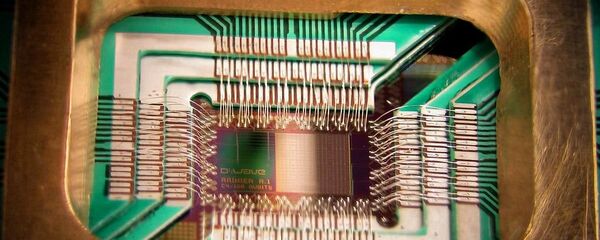MOSCOW (Sputnik), Tommy Yang — Chinese scientists successfully tested a quantum communications network, which features next generation quantum cryptography considered impenetrable to hackers, in eastern China’s Shandong province in early July.
In the test, local government offices in Jinan, the capital of Shandong province, transmitted over 4,000 pieces of encrypted data every second through 200 terminals in the city, according to the Jinan Institute of Quantum Technology, which is responsible for the test.
Co-Existence
However, experts warned that the quantum communications network was more likely to supplement existing networks, rather than replace them completely.
"It [the quantum network] will not replace, but supplement mathematical cryptography and networks. In the future, quantum and the usual classical communication networks will co-exist, with quantum ones augmenting and extending the classical communication's capabilities," Vadim Makarov, an assistant professor who leads the Quantum hacking lab at the University of Waterloo in Canada, told Sputnik.
The scientist added that quantum communications are much younger technology, and it thus comes at higher costs, has distance limitations, and slower speeds. It is a more financially feasible option at moderate distances.
"For example, if you are adding quantum key distribution to an existing VPN channel between company offices separated by a moderate distance (5-50 kilometers), the extra you have to pay for the quantum option is a minor part of your costs. You already use classical encryptions that are not cheap, and you are already leasing the fiber," he said.
China has completed a 2,000-kilometer (a 1242-mile) land-based quantum link between Beijing and Shanghai. The link is the longest in the world and runs through Jinan in Shandong province and Hefei in Anhui province.
Future of Cryptology
Nevertheless, Makarov stressed that it is still a wise decision for China to continue its efforts in testing and improving the technology, as it is the future of cryptology.
"The problem is the human mindset. We as the humans hesitate a lot to invest resources into solving future problems. Here China does a wise thing by developing and deploying security technologies that are future-proof, like quantum cryptography," he said.
The expert explained that in principle, everyone understands that existing mathematical cryptography technologies will be broken in the future. The problem is that anyone, who records and stores today's encrypted communications, will decrypt all of today's secrets in the future.
"For example, the NSA records a lot of internet traffic, they have a big data center for storage. They will decrypt all of it once the quantum computer becomes available. I am sure other countries are also recording traffic of interest for future decryption. This would not be happening if we were using quantum cryptography today," Makarov said.
Long-Term Investment
"From the technological point of view it is very significant. Our Chinese colleagues are pushing the limits of the distance over which quantum key can be distributed. They show that ‘sky is the limit," Artur Ekert, a professor in Quantum Physics and Cryptography at Merton College in the UK, told Sputnik.
While the rest of the world is also conducting research on quantum technology, China takes the lead when it comes to funding, the British scientist added.
"Europe and the United States have many research groups working on quantum security, including few commercial companies. But our Chinese colleagues have more funding and can develop some aspects of quantum technologies to greater extend," he said.
However, Ekert suggested that currently, quantum technology remains at its infancy, meaning that it will unlikely be commercially profitable in the near future.
"Quantum phenomena are very fragile and need sophisticated forms of protection if we want to utilize them in the future commercial products. Even though big business is interested, this is not an area where you can see real profit coming up within the next five or ten years." he said,
Ekert added that the world is slowly warming up to quantum technology, which is still considered as a long-term investment.





